Our smartphones serve as hubs for our memories captured in videos, so the need to transfer these moments to our computers has become increasingly essential. Mastering the art of video transfer is a valuable skill. In this comprehensive guide, we explore 8 methods to transfer videos from Android to PC. From manual USB connections to cutting-edge transfer solutions, we've got you covered. Let's embark on a journey through the different avenues available, ensuring you can effortlessly move your videos from the palm of your hand to the heart of your computer.

Which is the best way to send videos from a phone to a computer? Quite a few Android users recommend this video transfer software - Samsung Messages Backup. This software can transfer large videos from Android to a computer efficiently and keep the videos with original quality at the same time. Besides videos, you can transfer photos, ebooks, songs, contacts and so on to your computer swiftly.
- Transfer video from Android to PC in 1 click and retain 100% quality.
- Enable you to preview and select your Android videos on the interface before the transfer.
- Import videos from a computer to Android without hassle.
- Easily transfer music, photos, books, and other media data from Android phones to computers.
- Back up your basic info, such as contacts, text messages, etc.
- Backup and restore Android device files from laptop to Android fast.
More importantly, it is compatible with almost all Android phones, such as Samsung Galaxy S23/S22/S21/S20/S10, TCL 40 NxtPaper 5G/40 NxtPaper/40 XL/40 X/40 XE, REVVL 6x Pro/6x/6 Pro/6, T-Mobile REVVL V+ 5G/5G/4+/4, LG W41 Pro/W41/W31/W11, OnePlus, Xiaomi, Sony, ZTE, OPPO, etc. Most Android phones and tablets running Android 4 and upper are supported.
Welcome to download the video transfer tool below.
Step 1: Install the transfer software on your computer after downloading it. Then click "Android Assistant" to access it.
Step 2: Link your Android phone to the PC via a USB data cable. Choose "MTP" and enable USB debugging mode on the mobile device. Then the connection is ready.
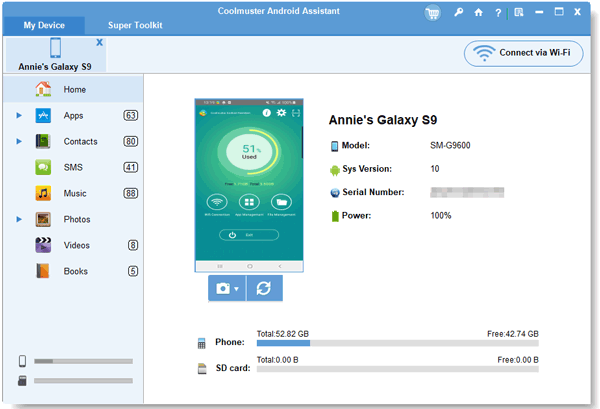
Step 3: Click the "Videos" category on the list. Your videos will appear on the right at once. Then click "Export" to save your videos to your computer. Once done, you can check and access your videos on the computer directly.
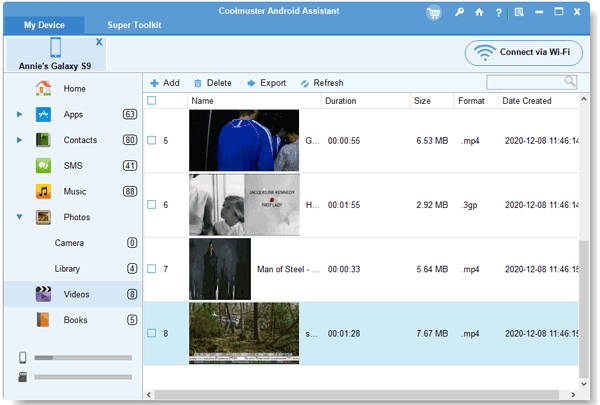
See also: [9 Options]Best Video Recovery App for Android: Easily Recover Android Videos
The Windows Photos app is a built-in application that comes with the Windows operating system. It is designed for viewing, organizing, and editing photos and videos on Windows devices. The app provides users with a simple interface to browse through their media files, create albums, and perform basic editing tasks. Thus, you can use it to move videos from your phone to your computer.
Step 1: Unlock your Android phone, and connect it to your Windows PC via a USB cable.
Step 2: Click the "Start" icon and select the "Photos" app.
Step 3: Tap the "Import" icon at the upper right corner, and select "From a USB device". Then choose the videos that you want to transfer. After that, they will appear on the computer.
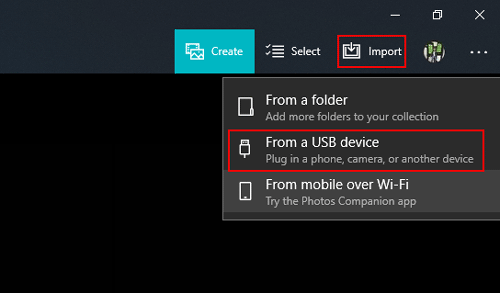
Read also: You can now copy iOS videos to an Android device in 6 easy ways. Open the guide to get the tricks.
Nearby Share is a feature on Android devices that allows users to share files, including videos, with nearby devices using Bluetooth and Wi-Fi. Please note that the steps and availability of features might change, and it's recommended to check the latest information on your specific Android device and operating system version. By the way, it only works on Windows computers currently.
Step 1: Download and install Nearby Share on your PC from this website: https://www.android.com/better-together/nearby-share-app/.
Step 2: Enable the "Bluetooth" and "Wi-Fi" features on both devices. Then open the app on your PC, sign in with your Google account, and choose "Your devices" under the "Receiving" settings. Then you can share files between the devices signed in with the same account.
Step 3: Open File Manager on your Android phone, and find your videos. Then long-press a video, and click "Share" to select "Nearby Share". Next, click "Accept" on the PC. You will receive the videos soon.
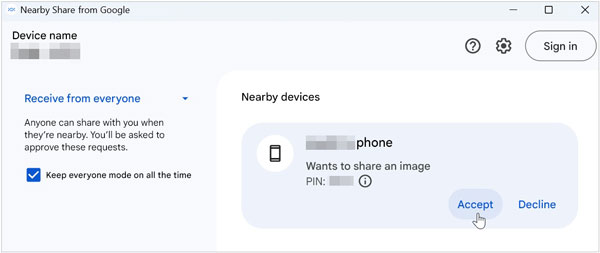
Google Drive is a nice platform to sync files between mobile phones and computers. Moreover, it supports Android, iOS, Windows, and Mac. You can also access your files from Google Drive web on your device, which is more convenient than installing an app. But it requires a stable network to transfer videos and files.
Step 1: Install Google Drive on your Android device, or you can open your phone browser to visit Google Drive web. Then sign in with your account credentials.
Step 2: Click "+" to upload your videos from your Android phone.
Step 3: Open Google Drive on your computer via a browser, and log in to the same account. Then, you can see your uploaded videos on the interface. Download them to a PC's folder.

Dropbox is a useful cloud-based file storage and collaboration platform, and you can use it to share your videos from Android to a computer. As long as your videos are within 5GB, you can sync your videos at once via Dropbox for free.
Step 1: Install the Dropbox app on your Android phone, and sign up for an account.
Step 2: Finish the setup, and click "+" to select your desired videos from the internal storage of your phone. They will be uploaded to Dropbox.
Step 3: Log in to your Dropbox account on your laptop, and check the videos. Then click "Download" to save them to your computer.

Further reading: You can also transfer your Android call logs to your computer for backup. Follow the steps to make it.
AirDroid is a mobile device management and file transfer tool that allows you to wirelessly connect your Android device to your computer. It's easy to send videos from a phone to a computer via AirDroid, but every single file should not exceed 30MB for free accounts if your phone and computer don't use the same network.
Step 1: Make sure both devices are connected to the same Wi-Fi network, so you can send videos without size restrictions.
Step 2: Install AirDroid on your phone and computer, and register the app. Then sign in on both devices.
Step 3: On the phone, choose your PC device, and click the "Attachment" icon to pick your video files. Then send them to your PC. After that, you will receive the videos on your computer.

AirMore is another wireless transfer tool between devices, allowing users to manage and transfer files between their mobile devices and computers wirelessly. However, it requires your devices to use the identical network for the file transfer.
Step 1: Install AirMore on your Android phone, and go to "https://airmore.com/" on your computer. Then choose "Launch AirMore Web to Connect". Open the app on your phone, and scan the QR code on your PC for the connection.
Step 2: Click the "Files" icon on the computer, and locate your Android videos.
Step 3: To save the videos to your PC, click the "Download" icon. Then you can watch your videos on your desktop.

Can you transfer videos from an Android phone to a computer via email? Actually, you can, but it is suitable for small videos because you can attach the files within 25MB in general to an email. If you want to share a movie, using email is not a good idea.
Step 1. Find Video Files
In the beginning, you need to find your video files on your Android device. It is probable that you store it on the Gallery app.
Step 2. Send Videos to Mail
- When you find the video, press on it and you will see the "Share" icon at the bottom menu bar. Click on it and then choose the "Mail" option. Here, we take Gmail as an example.
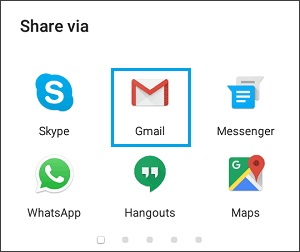
- Type your mail address on your mail app, you can use the identical mail address on "From" and "To" items. Next, click the "Send" icon like a plane on the top.

Step 3. Sign in your Mail Account on computer
- On your computer, please open a browser and then sign in your mail account you just sent. You will see your video in the "Inbox".
- Click the email and right-click on the video to select the "Save" option. You can select a location on your PC on the pop-up window. At last, the video will be downloaded to the PC.
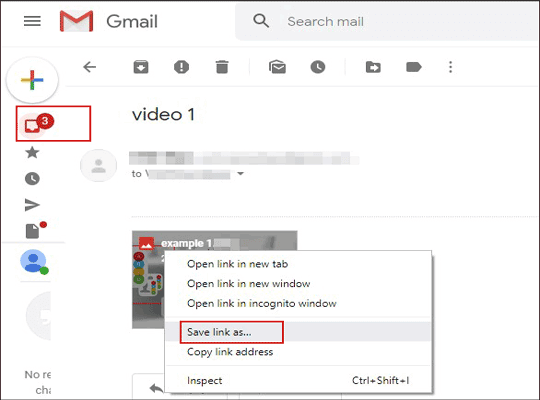
Check it if you need: How to transfer data from iPhone to Android device, is it possible?
Generally speaking, videos in digital formats (MP4, AVI, MOV, etc.) can be transferred between devices through USB drives, cloud storage, email, or file-sharing services.
Yes, there are limitations on video size for different methods of transfer, and these limitations can vary depending on the platform or medium used. For example, Gmail has a limit of 25MB for attachments; Samsung Messages Backup can transfer videos without limitation so long as there is sufficient storage space on your computer.
If transferred videos are not playing on your PC, there are several potential reasons for this issue. Here are some steps you can take to troubleshoot and resolve the problem:
A. Check File Format and Compatibility: Ensure that the video file format is supported by your media player. Common formats include MP4, AVI, MKV, and MOV. If the file format is not supported, consider converting it to a compatible format using video conversion software.
B. Update Media Player: Make sure your media player is up to date. Outdated software may not support certain codecs or file formats. Download the latest version of your preferred media player or try using a different one.
C. Install Codecs: Some video files may require specific codecs to play. Install a comprehensive codec pack or the specific codec needed for your video file. Popular codec packs include K-Lite Codec Pack and CCCP (Combined Community Codec Pack).
D. Check for Corruption: The video file may be corrupted during the transfer process. Try transferring the file again or download it from the original source. If the issue persists, the file may be damaged.
E. Update Graphics Drivers: Ensure your graphics drivers are up to date. Outdated or incompatible graphics drivers can cause playback issues. Visit the website of your graphics card manufacturer to download and install the latest drivers.
Speeding up the video transfer process involves optimizing the method of transfer and addressing potential bottlenecks. Here are some tips to help you transfer videos more quickly:
A. Use High-Speed Connections: When transferring videos between devices, use high-speed connections like USB 3.0 or USB-C for wired transfers. For wireless transfers, utilize the latest Wi-Fi standards (e.g., Wi-Fi 6) for faster data rates.
B. Choose the Right Transfer Method: Consider the most efficient transfer method based on your needs. Direct cable connections (USB, Thunderbolt) are generally faster than wireless transfers. For extremely large files, physical transfer methods (external drives, USB) might be quicker than online transfers.
C. Use Compression: Compressing video files before transfer can reduce file size and speed up the process. However, this may result in some loss of video quality. Use a video compression tool or format that balances file size and quality.
D. Close Unnecessary Applications: Closing other applications and processes on your computer can free up system resources and improve transfer speeds. This is especially important for older or less powerful computers.
As we wrap up this guide, you've now become versed in the methods to seamlessly transfer videos from your Android device to your PC, right? From the stable transfer of using Samsung Messages Backup to the wireless transfer of using Google Drive, Nearby Share, etc., you have 8 options at your disposal.
Feel free to revisit the specific sections as needed, and may your video transfer endeavors be as smooth as the memories captured in each frame.
Related Articles
Move Videos to SD Card Effortlessly on Android Device
Easily Transfer Files from Android to Mac: 7 Amazing Solutions
Fast Transfer Contacts from Android to Nokia without Info Loss
Remotely Access PC Files from Android Devices [4 Easy Approaches]
Select Best File Manager for Android from A Full List [Reliable]
How to Recover Deleted PDF Files from WhatsApp on Android and iOS Devices
Copyright © samsung-messages-backup.com All Rights Reserved.